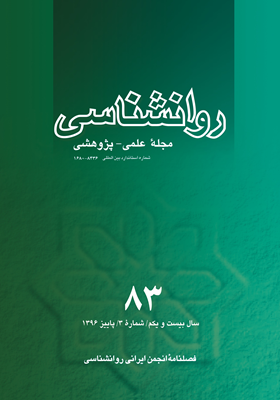مقایسه تأثیر معنویت درمانگری و فراشناخت درمانگری بر بهزیستی روانشناختی فرزندان دختر شاهد و ایثارگر
محورهای موضوعی :مریم اسماعیلی 1 , نوشین بصیری 2
1 - دانشگاه اصفهان
2 - گروه روانشناسی، دانشکده علوم تربیتی و روانشناسی، دانشگاه اصفهان
کلید واژه: معنویت درمانگری, فراشناخت درمانگری, بهزیستی روانشناختی, فرزندان شاهد و ایثارگر,
چکیده مقاله :
هدف اصلي پژوهش حاضر مقايسه تأثیر دو روش معنویت درمانگری و فراشناخت درمانگری بر بهزيستي روانشناختی بود. 60 دانش آموز دختر فرزند شاهد و ایثارگر شهر اصفهان در سه گروه مداخله معنویت درمانگری، مداخله فراشناخت درمانگری و گروه کنترل گمارده شدند(هر گروه 20 نفر). شرکت کنندگان به پرسشنامه جمعیت شناختی و پرسشنامه بهزيستي روانشناختی(ریف، 1995) پاسخ دادند. نتايج نشان داد که مداخلات معنویت درمانگری و فراشناخت درمانگری در افزايش بهزيستي روانشناختی دو گروه آزمایش، در مقایسه با گروه کنترل، مؤثر بود. همچنين در بررسي زير مقياس هاي بهزيستي روانشناختی، پذیرش خود، ارتباط مثبت با دیگران، خودمختاری، رشد شخصی و تسلط بر محیط در مرحله پس آزمون بهبود نشان دادند. در مرحله پیگیری نیز بین میانگین های دو گروه آزمایش و گروه کنترل در زير مقياس هاي پذیرش خود، رابطة مثبت با دیگران، خودمختاری، زندگی هدفمند، رشد شخصی و تسلط بر محیط تفاوت معنادار وجود داشت. همچنین یافته ها نشان دادند که در زيرمقياس هاي پذیرش خود، خودمختاری، رشد شخصی و تسلط بر محیط، در مرحله پسآزمون، مداخله فراشناخت درمانگری از معنویت درمانگری مؤثرتر بود.
The aim of this study was to compare the effectiveness of two methods of spirituality therapy and metacognitive therapy on the psychological wellbeing. There for sixty students were recruited from Isfahan's female attending students schools and divided into three groups: Spirituality therapy, intervention metacognitive, and control groups. (each group 20 individual) the participants to the demographic and Psychological Well-being Questionnaire (Ryff,1995) responded. The results showed that therapy interventions spirituality and meta-cognitive therapy increased psychological well-being in the experimental group compared with the control group, was effective. In the study of psychological well-being subscale, the two group experimental compared to the control group in the domains of self-acceptance, positive relationships with others, autonomy, personal growth and mastery of the environment in the posttest showed improvement. In the follow-up between the two groups and the control group on measures of self-acceptance, positive relations with others, autonomy, purpose in life, personal growth and mastery of the environment, there is a significant difference. The findings also showed that the domains of selfacceptance, self-determination, personal growth and mastery of the environment, in the post-intervention was more effective meta-cognitive therapy, spiritual therapy.
